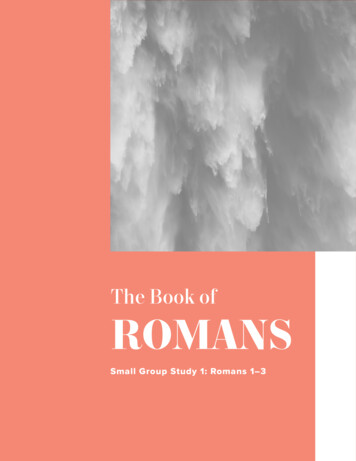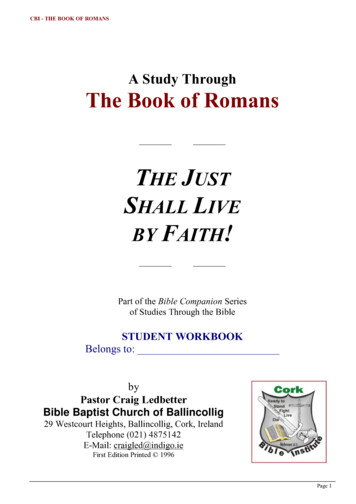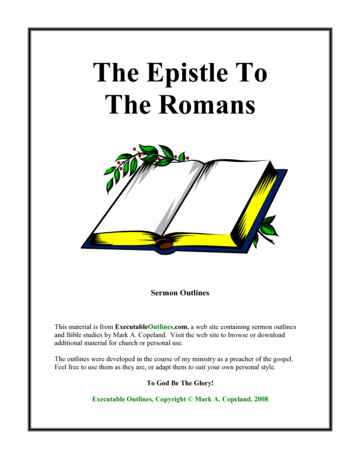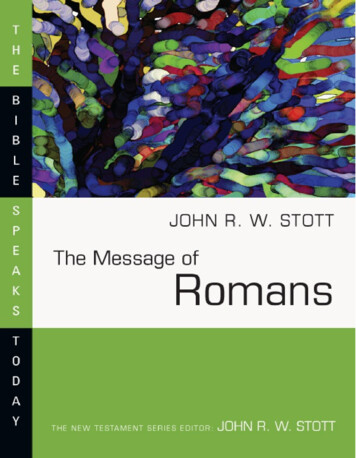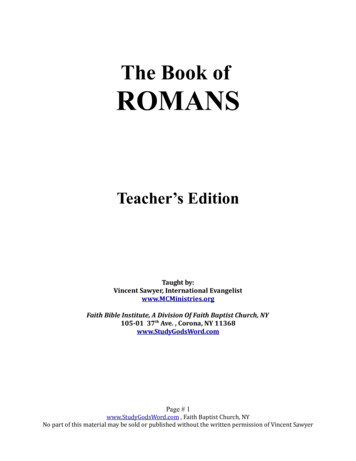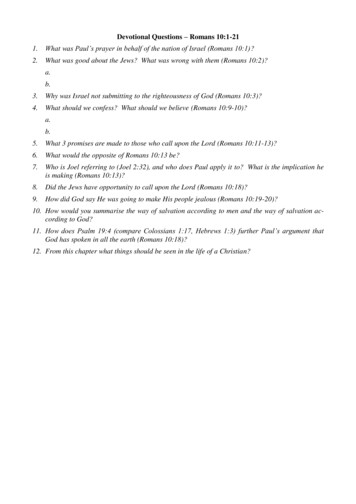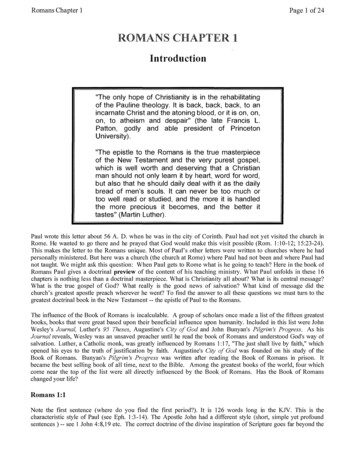
Transcription
Romans Chapter 1Page 1 of 24ROMANS CHAPTER 1Introduction"The only hope of Christianity is in the rehabilitatingof the Pauline theology. It is back, back, back, to anincarnate Christ and the atoning blood, or it is on, on,on, to atheism and despair" (the late Francis L.Patton, godly and able president of PrincetonUniversity)."The epistle to the Romans is the true masterpieceof the New Testament and the very purest gospel,which is well worth and deserving that a Christianman should not only learn it by heart, word for word,but also that he should daily deal with it as the dailybread of men's souls. It can never be too much ortoo well read or studied, and the more it is handledthe more precious it becomes, and the better ittastes" (Martin Luther).Paul wrote this letter about 56 A. D. when he was in the city of Corinth. Paul had not yet visited the church inRome. He wanted to go there and he prayed that God would make this visit possible (Rom. 1:10-12; 15:23-24).This makes the letter to the Romans unique. Most of Paul's other letters were written to churches where he hadpersonally ministered. But here was a church (the church at Rome) where Paul had not been and where Paul hadnot taught. We might ask this question: When Paul gets to Rome what is he going to teach? Here in the book ofRomans Paul gives a doctrinal preview of the content of his teaching ministry. What Paul unfolds in these 16chapters is nothing less than a doctrinal masterpiece. What is Christianity all about? What is its central message?What is the true gospel of God? What really is the good news of salvation? What kind of message did thechurch's greatest apostle preach wherever he went? To find the answer to all these questions we must turn to thegreatest doctrinal book in the New Testament -- the epistle of Paul to the Romans.The influence of the Book of Romans is incalculable. A group of scholars once made a list of the fifteen greatestbooks, books that were great based upon their beneficial influence upon humanity. Included in this list were JohnWesley's Journal, Luther's 95 Theses, Augustine's City of God and John Bunyan's Pilgrim's Progress. As hisJournal reveals, Wesley was an unsaved preacher until he read the book of Romans and understood God's way ofsalvation. Luther, a Catholic monk, was greatly influenced by Romans 1:17, "The just shall live by faith," whichopened his eyes to the truth of justification by faith. Augustine's City of God was founded on his study of theBook of Romans. Bunyan's Pilgrim's Progress was written after reading the Book of Romans in prison. Itbecame the best selling book of all time, next to the Bible. Among the greatest books of the world, four whichcome near the top of the list were all directly influenced by the Book of Romans. Has the Book of Romanschanged your life?Romans 1:1Note the first sentence (where do you find the first period?). It is 126 words long in the KJV. This is thecharacteristic style of Paul (see Eph. 1:3- 14). The Apostle John had a different style (short, simple yet profoundsentences ) -- see 1 John 4:8,19 etc. The correct doctrine of the divine inspiration of Scripture goes far beyond the
Romans Chapter 1Page 2 of 24idea of mere mechanical dictation. Instead the personalities and styles of the human writers are clearlyobservable, and yet what they wrote is free from error and exactly what God intended--see 2 Peter 1:20-21 and 2Tim. 3:16. Each Bible writer had his own unique style and characteristics, and yet God used them as His penmento record exactly what the Lord wanted to be included in His Word.In verse 1 Paul tells us three things about himself:1) SERVANT slave, bond-servant, love-slave of Jesus ChristThis is an amazing statement when we consider Paul's past background (see Acts 7:58; 8:1-3; 9:1-2; 1 Cor. 15:9;1 Tim. 1:13-15). Saul of Tarsus was the church's greatest enemy. How did the church's greatest enemy becomethe church's greatest apostle? How can we explain the amazing transformation described in Galatians 1:23? Howcan Saul the persecutor become Paul the "servant of Jesus Christ" (Rom. 1:1)? SOMETHING MUST HAVEHAPPENED!!According to the New Testament, what happened to cause such a change? What caused the conversion of Saul ofTarsus? See 1 Corinthians 9:1 -- "have I not SEEN Jesus Christ our Lord" and compare Acts 9:3-6 and 1 Cor.15:8. Hostile critics of Christianity must come up with a satisfactory explanation for the conversion of Paul.George Lyttelton (1709-1773) studied the conversion of St. Paul in an attempt to disprove Christianity. He wasconverted as a result of his research. In his remarkable paper, "Observations on the Conversion of St. Paul" I Thisarticle is found in the classic set called The Fwulamentals edited by R.A. Torrey and A.C.Dixon and othe1·s,Vol. H, page 3531he sets forth four propositions which seem to exhaust all the possibilities in the case:Paul was an impostor who said what he knew to be false, with an intent to deceive (he really didn'tsee the risen Christ, but he said he did).He was a fanatic ("enthusiast") who suffered from the force of an overheated imagination (hesincerely thought he saw the risen Christ, but he really did not).He was deceived by the fraud of others (others somehow tricked him into thinking he saw the risenChrist).What he declared to be the cause of his conversion did actually happen, and therefore the Christianreligion is a divine revelation (Paul really did see the risen Christ and therefore Christianity is trueand Christ is alive!).What problems do you see with the first three possibilities?2) Apostle one who is sent on a missionGod had a unique and special ministry for Paul and the other apostles. ARE THERE STILL APOSTLES IN THECHURCH TODAY?In Eph. 2:20 the apostles are said to be "foundational" men. A foundation is only laid once at the beginning, of abuilding project. The apostles were needed in the beginning of the church age to fulfill their special"foundational" ministry.No one today can meet the qualifications of an apostle, because an apostle must have SEEN the RISEN CHRIST(1 Cor. 9:1; 15:8-9 and Acts I :22 -- finding a replacement for Judas). Christ does not appear to men today ( 1 Peter1:8; John 16:10).Application: see Acts 2:42. Today we do not have apostles but we have the DOCTRINE or the TEACHING OFTHE APOSTLES. We do not have the Apostle Paul today, but we do have the DOCTRINE OF THE APOSTLE
Romans Chapter 1Page 3 of 24PAUL, namely the BOOK OF ROMANS (and his other writings that are now part of Scripture).3) Separated unto the gospel of GodThere is a negative aspect to separation (separation from sin, from the things of the world, etc.) but this verseemphasizes one of the positive aspects (not SEPARATION FROM but SEPARATION UNTO). Paul'sdedication and devotion to the gospel of God is seen in Romans1:16; 1 Cor. 1:17-18; 2:1-2; 9:16; 15:1-4; Eph.6:19-20; Acts 20:21,24.Key phrase in the book ofRomans THE GOSPEL OF GOD (this is what the book of Romans is all about)GOSPEL good news, glad tidingsNowhere in the Bible is the good news of salvation more clearly unfolded than in the book of Romans. Paulskillfully and systematically presents the gospel of God in this epistle. Today there is much confusion as to whatthe gospel really is and how it should be presented (See What is the True Gospel?). Let's carefully study howPaul defined end explained and presented the gospel, and may we never forget where Paul got his gospel from(see Galatians I :II- I 2). Also let's be on the alert for FALSE GOSPELS (see Galatians 1:6-9).Romans 1:2The Gospel is not something NEW (newly revealed). The Gospel was revealed even in the Old TestamentScriptures (compare Galatians 3:8).The glorious facts about the death and resurrection of Christ are not now being revealed for the first time. In thebook of Romans (in which Paul sets forth the gospel of God) Paul constantly quotes from the Old Testament (61times). For examples of Paul's usage of the Old Testament, see Romans 3:10-18 and Romans 4:1-3. The goodnews concerning Christ is found in the Old Testament (compare Luke 24:26-27,44). Isaiah 53:6 (the first part ofthe verse) sums up Romans 1-3 (All men condemned before a holy God). Isaiah 53:6 (the last part of the verse)sums up Romans 4-5 (Christ died to save and justifY sinful men).Romans 1:2"Holy scriptures (writings )" -- compare what is written on the cover of most Bibles (HOLY BIBLE). Holy setapart. The Bible is set apart and different from all other books. It is in a class of its own. As a book it is totallyunique. It is the only "God-breathed" (inspired) book (2 Timothy 3:16). As someone has said, "I believe the Biblefrom cover to cover and I even believe the cover (HOLY BIBLE)!" May we always handle the Bible with care,knowing that it is God's Holy Word. ATribl1tt?JQJhe 13ibleRomans 1:3-4What is the Gospel all about? According to Rom. 1:3 the GOSPEL concerns God's Son, Jesus Christ our Lord. ITIS A CHRIST-CENTERED GOSPEL. (compare Rom. 1:9 "the gospel of his Son"). The gospel concerns Christand apart from the Person and work of Christ there is no gospel (see 1 Cor. 15:1-4 where we have the gospel in anutshell). Any preaching that is not Christ-centered is not true gospel preaching. The true gospel is a CHRIST CENTERED GOSPEL, and God gives very strong warnings concerning those who preach any other gospel(Galatians I :3-9).When you think of the PERSON OF CHRIST you should think especially of two things:1. His humanity (ROMANS 1:3 and see also John 1:14; Matthew 1:1; 1 Tim. 2:5). He was made(see John 1:14) of the seed of David according to the flesh. Christ was in the kingly line, adescendant of David. Why did God become a man? Hebrews 2:9 helps us with this question.
Romans Chapter 1Page 4 of 242. His deity (Romans 1:4 and see also John 1:1; 20:28; Tit. 2:13; 1 Jn.5:20, etc. He became a manbut He never ceased being God. The term "Son of God" points to the full deity of Christ. This ishow the Jews of the first century understood the term (see John 5: 17-18). The Deity of ChristNote: Read Matthew 22:41-46. The Jews knew that the Messiah must come from the line of David(Matt. 22:42). The Jews also understood Psalm 110:1 as being a reference to the Messiah: "TheLORD (Jehovah, referring to God the Father) said unto my (the pronoun "my" refers to David, thewriter of the Psalm) Lord ("Adonai" meaning "Lord" or "Master", and here referring to the Messiahor the Christ). The Jews were baffled by our Lord's question (Matthew 22:45-46) which is simplythis: HOW CAN DAVID'S SON ALSO BE DAVID'S LORD? Paul answers this question inRomans 1 :3-4.In His humanity ("according to the flesh") He is the Son of David (Romans 1 :3). In His deity He isthe Son of God (Romans 1:4), and thus He is David's Lord. His resurrection was the final proof thatHe was everything that He claimed to be.He did not become God at the incarnation, nor did He become the Son. The incarnation was thepoint at which God's eternal Son assumed our humanity, without ceasing to be God. The Son ofGod became the Son of Man, that we, the sons of men, might become the sons of God (John 1: 12;Gal. 3 :26). May we ever be filled with wonder and praise for His condescending love and grace bywhich He stooped so low in order to raise us so high! "Behold, what manner of love the Father hathbestowed upon us, that we should be called the sons of God" (1 John 3:1).Compare Romans 1:3-4 with Romans 9:5 (do you see the emphasis on His humanity as well as theemphasis on His deity?)."By the resurrection" -- The resurrection was the final proof that Jesus Christ was everything Heclaimed to be (compare Matthew 12:38-40 and John 2:18-21).Either Jesus Christ rose again from the dead or He did not. Explain the problems and inadequacies of thefollowing false theories:1.2.3.4.The disciples stole the body of Jesus (compare Matthew 28: 11-15).The body of Jesus was removed by Joseph of Arimathaea (see Matthew 27:57-60).The women and then everyone else went to the wrong tomb.The people who claimed to see Christ actually had hallucinations and visions. They thought they sawChrist but they really didn't.5. Jesus did not actually die on the cross, and when they put Him in the tomb He was still alive."With power" -- In the Old Testament, whenever God wanted to point out His great power He pointed to themiracle of the crossing of the Red Sea (Deut. 26:8; Exodus 32:11; Deut. 4:37; 2 Kings 17:36; etc.). We do notfind this in the New Testament. Today when God wants to point out His mighty power, to what great event doesHe draw our attention (Eph.1 : 19-20; Philippians 3:1 0)? When God wants us to see His love He points us to thecross (John 3:16; Romans 5:8; 1 John 4:10); when God wants us to see His power He points us to the emptytomb.When you think of the WORK of Christ you should think especially of two things: 1) His crucifixion 2) Hisresurrection. You will find these two key events mentioned in each of the following passages: Romans 4:25; 1Corinthians 15:3-4; 2 Corinthians 5 : 14-15; and 1 Thess.4:14.Romans 1:5
Romans Chapter 1Pa ge 5 of 24Romans 1:5To whom should the gospel be preached? Paul's answer: "ALL NATIONS" (compare Mark 16:15; Matt. 28:19;Luke 24:47 and Acts 1 : 8). The term "grace" refers to God's undeserved favor and unmerited kindness. Paulrealized how undeserving he was and that he did not deserve to be an apostle (see 1 Cor. 15:9-10 and Eph. 3:8)."For obedience to (of) the faith"-The gospel must be OBEYED. It is BY FAITH that a person obeys the gospel.Please note the following:1. Read Acts 16:30-31 and notice that verse 31 is a command!2. Read 1 John 3:23. What is the first commandment that a sinner must obey? What is the first thing that aperson must do in order to please God (compare Hebrews 11:6)?3. Acts 17:30. What is God's command? Who is given this command?4. 2 Thessalonians 1:8. Unbelievers are those who obey not the gospel of our Lord Jesus Christ.5. Unbelief is a very serious thing: John 3:18; 3:36; 8:24; 16:9;. etc.Paul's MOTIVE -- "for His Name". Paul's only concern was for the Name and glory and reputation of His Lordand Saviour (compare 1 Cor. 10:31; 3 John 7).Romans 1:6What is God doing in the world today?"Among whom" among the nations (v.5)Today God is visiting the Gentiles (nations) and taking out of them a people for His Name (Acts15:14). Christ is building His church (Matthew 16:18). The term "church" (Greek-ekklesia) refersto God's called-out assembly. God is calling people unto the fellowship of Himself (1 Cor. 1:9).Has God called you out of darkness and into His marvelous light (1 Peter 2:9).Romans 1:7The recipients of Paul's letter were the Roman believers:1. They were "beloved of God" greatly loved by God. We will learn more about God's great and amazinglove in Romans 5.2. They were "called to be saints". A saint is "a holy one, a set apati one, a person who is separated from sinand separated unto the service of Christ." Every believer is a saint, but sometimes believers do not livevery saintly. We will learn how to live saintly in Romans 6 and following.Romans 1:8-13AN IMPOR1 ANT LESSON ON PRAYEI (with Paul as our example)There at least eight things we learn about prayer from these verses:1. Prayer Should Include Thanksgiving (Verse 8).Paul was thankful to God for the Christians who lived in Rome, and he was especially thankful for their FAITH.These people were FAMOUS FOR FAITH. Their faith had gained them a world-wide reputation (compare 1Thess. 1:8 where we learn that the Thessalonian Christians were also famous for their faith). What is FAITH?There are two simple Bible definitions of faith found in Romans 4:21 and Acts 27:25. [Contrast the first centurychurch of Rome, the one Paul wrote to, with the Church of Rome today. 'fhe Church of Rome today is alsofamous -- famous for its traditions, sacraments, ritual, papal leadership, etc. -- but not famous for faith in
Romans Chapter 1Page6 of 24God and His Word I. Paul was thankful that in the capital of the pagan Roman empire there were those whoworshipped and believed the true and living God.2. Prayer Must Be "Through Jesus Christ" (Verse 8).We can come to God in no other way (John 14:6). He is our great MEDIATOR (1 Tim. 2:5) and apart from Himprayer would be impossible. This is why we pray "in Jesus' Name."3. Prayer Should Be Constant (Verse9).Paul prayed for the Romans "without ceasing" (verse 9 and compare 1 Thess.5: 17). This same Greek expressionwas used to describe a HACKING COUGH (coughing without ceasing). Just as a hacking cough stays with aperson throughout the day, so Paul's prayerful concern for the Roman believers was something that was alwayswith him.4. Prayer Should Be Genuine (Verse 9).God was Paul's witness. God knew what kind of prayer life Paul really had. Other people cannot witness yourprayer life; only God can. Paul was not just pretending to be a man of prayer. Paul knew that his prayer life wasgenuine and he knew God knew.5. Prayer Should Involve Intercession (Verse 9).Paul made personal mention of these Roman believers. Paul reached many souls with his preaching and be alsoreached many souls with his praying. Who did Paul mention in his prayers? In Romans chapter 16 we find 26names given! (Did Paul use some kind of a prayer list?) For whom do you pray? Paul faithfully obeyed thecommand found in Ephesians 6:18.6. Prayer Should Be Specific (Verse 10).Paul made a specific prayer request. He prayed for a "prosperous journey." There is no detail in life that is sotrivial that we cannot make it a matter of prayer. If God is concerned about feeding the sparrow and aboutclothing the lily, then He certainly was concerned about Paul's trip to Rome. "0 what peace we often forfeit, 0what needless pain we bear, All because we do not carry everything to God in prayer!"7. Prayer Should Be Submissive (Verse 10).Note the key phrase: "by the will of God." Compare the prayer of Jesus in Luke 22:42. Paul did not demand ofGod or order God or dictate to God what he wanted. He simply made a request and wanted the request grantedonly if it was the will of God.8. Prayer Should Be Rightly Motivated (Verses 11-12).Did Paul have good reasons for requesting a "prosperous journey" to Rome? Why did Paul want to go to Rome?1) He wanted to do God's will (verse I 0); 2) He wanted to establish (strengthen, confirm) the Roman believerson the Rock, Christ. Jesus (verse 11); 3) He wanted to comfort and encourage these believers (as well as becomforted and encouraged by them) -- (verse 12). Paul's reasons were good reasons. He was concerned for theglory of God and the good of others.HOW DID GOD ANSWER PAUL'S PRAYER? Paul had a great desire to go to Rome (see verse 11 -- "for I long(earnestly desire) to see you" -- compare I Peter 2:2 where the same word is used of a new believer's longing forGod's Word). See also Romans 15:23 -24. Many times Rome was included on Paul's travel itinerary, but again andagain Paul was hindered from making this trip (Rom. I : 13 and Rom. 15:22). One reason Paul wanted to go to
Romans Chapter 1Page 7 of 24Rome is found in Romans 1:13. Another reason is suggested by Acts 9:15. Paul knew that God had given him aspecial ministry "to kings" and there was no better place to find a king than in Rome. THE KING (Caesar! TheRoman Emperor! ) lived there!Did God answer Paul's prayer? Did Paul eventually get to Rome? Yes he did, but he got there in a very unusualway. God does not always answer our prayers as we think He should. Paul's prosperous journey (see Romans1:10) turned out to be one of the moat treacherous and dangerous trips across the Mediterranean Sea you couldever imagine (described in detail for us in Acts chapter 27). Certainly the trip was not what Paul expected. AlsoPaul came to Rome under very unusual circumstances. HE WAS ESCORTED THERE AS A PRISONER! Paul'sprayer was answered but in a very unusual way! As the hymnwriter has said:God moves iw1 awnylHs W'tmders toHe phmts His footsteps in Hw sea,And rides upon the storm.in tmfathomab!e rni:nesOf m ver-f: HRomans 1:14"Debtor" I owe something! I have an obligation! I have a gospel duty! Compare 1 Corinthians 9:16."Greeks and barbarians" were two classes of Gentiles. "Greeks" were those under the influence of Greekculture and language (the Greek language was the universal and "common" language of the Roman empire, andPaul's letter to the Romans was written in common [Koine] Greek, not in Latin and not in Hebrew). "Barbarians"were foreigners, those not under the direct influence of Greek culture (see Acts 28:2,4).Paul owed the gospel to every member of the human race. At one point in his life Paul (Saul of Tarsus) felt anobligation to persecute every Christian; but now Paul felt an obligation to preach to every creature (Paul wasprobably familiar with Mark 16:15). What obligation or gospel duty do you have (see 2 Cor. 5:17-21)? Those whoare recipients of God's good news feel burdened and obligated to pass it on to others! If you were a medicalresearcher and you discovered a cure for cancer, would you keep it a secret? Life is short; death is sure; sin thecause, CHRIST THE CURE!Romans 1:15"Ready" ready, willing and eager (compare Acts 17:11 -"with all readiness of mind")."Preach the gospel" evangelize, announce the good news, proclaim the gospel. Compare the word"evangelical" (an evangelical church is supposed to be a church that believes God's good news and faithfullyproclaims this message of salvation)Romans 1:16Notice the THREE GREAT "I AM'S" of the Apostle Paul:"I AM NOT AS.HAi\Umn (verse HI)"Not ashamed" -- Paul was not ashamed to go to prison for the sake of the gospel and he was not ashamed to die
Romans Chapter 1Page 8 of 24for the sake of the gospel. See what our Lord said in Luke 9:26 and compare 2 Timothy 1:8,12. Christians shouldnot be ASHAMED of the gospel and they should not be a SHAME to the gospel (by living contrary to itsprinciples)."Power of God" Greek word DUNAMIS (cf. Eng.-dynamite!). See 1 Cor. 1:18,24. Creation was mere finger play to God (Psalm 8:3) but redemption required nothing Jess than the mighty arm of God (Isaiah 53:1)! Creationcost God very little; redemption cost God His only Son. It took the power of God to transform Saul (the chiefpersecutor) into Paul (the chief apostle). It takes the power of God to save and transform any sinner (compareColossians 1:13 and Acts 26:18)."Everyone"-- God's gospel is not for a select few, it is for everyone"Believeth" -- The gospel must be believed (human responsibility). God does the saving but man must do thebelieving. Faith is the hand of the heart which reaches out and receives God's gift of salvation (Rom. 6:23)."Salvation" -- Everyone who believes the gospel is saved (compare Acts 16:30-31; 1 Cor. 1:21; 1 Cor. 15:1 -2;Luke 8:12; John 6:47; etc.)."To the Jew first" -- Here we have an amazing demonstration of God's grace. The Jews were the very ones whorejected their Messiah (John 1 : 11) and crucified Him (John 19:14-16). Yet these same people were the first onesto hear God's good news! The gospel went first to the Jews. Those who heard the gospel on the day of Pentecost(Acts 2) were all Jews. The Gentiles did not hear the gospel until Acts chapter 10. Today the gospel is to go to allmen without distinction (see Romans 10: 12-13).To the Jew First"Then Paul and Barnabas waxed bold, and said, It was necessary that th wv rd gf G:c: d sbQl!l(Lflr tb J' b en s nc: kelltc: yoy: but seeing ye put it from you, and judge yourselves unworthy of everlasting life, lo,we turn to the Gentiles" (Acts 13:46).Paul used very strong language here: "IT WAS NECESSARY!" It was absolutely essential that the gospel go tothe Jew first. Here are several reasons why the word of God had to be first proclaimed to the Jews:1. The gospel had to go to the Jew first because "SALVATION is of the JEWS" (John 4:22). The SaviorHimself was a Jew. Since salvation is of the Jews it is only fitting that the glorious message of salvationshould go FIRST to the Jews.2. The gospel had to go to the Jew first because Christ came into the world for the purpose of saving "Hispeople from their sins" (Matthew 1:21). "His people" is a clear reference to the people of Israel (compareMatthew 2:6 and compare Acts 10:42 where "this people" is most probably a reference to the Jews). It wasonly fitting therefore that the message and blessings of salvation should go first to Israel (compare Acts3:26).3. The gospel had to go to the Jew first because it was the Jews who were given the Hebrew Scriptures(the 39 books). See Romans 3:1-2 and 9:4. They of all people should have recognized the promised Saviorand should have acknowledged Him as the Christ, the Messiah of Israel. It is not strange, therefore, that itwas Paul's custom to go into the synagogues of the Jews on the Sabbath day and reason with them from theScriptures, showing them clearly that Jesus of Nazareth was the promised Messiah. God sent the gospel tothe Jews first because they should have been the FIRST to recognize the Christ of the gospel as the Onewho was promised afore in the law and the prophets.4. The gospel had to go to the Jew first because God wanted to show that He was a gracious God. Did the
Romans Chapter 1Page 9 of 24Jews deserve to hear the gospel FIRST? They were the ones who rejected and crucified their Messiah (seeMatthew 27:22; Acts 2:23; 2:36; 3:14-15; 5:30; 7:52; 10:39; 13:27-28; 1 Cor. 2:8; Zech. 12:10; 1 Thess.2:14-16). They should have been the last to hear. In fact, they did not deserve to hear at all. They rejectedtheir Savior but God did not reject them. How gracious God was to reach out first and foremost to theundeserving Jewish people. When Israel's sin was greatest, God's grace was greater (compare Rom. 5:20).C.H.Mackintosh beautifully explains God's gracious dealing with the Jews:He tells them to "begin at Jerusalem." Yes, Jerusalem, where ourLord was crucified; where every indignity that human eamurderer and a robber was preferred to "God manifest in theflesh"; where human iniquity had reached its culminating point essengers were to begin their blessed work; that was to be thecentre of the sphere of their gracious operations; and from thencethey were to travel to the utmost bounds of the habitable globe.Theyweremurdererstoofbegintheeverywhere thewithSon"Jerusalemof God,gloriousandtidings,sinners"-withthenso thatgoforththetoverypublishall might know thatprecious grace of God which was sufficient to meet the crimsonguilt of Jerusalem itself.How glorious is all this! The guilty murderers of the Son of Godwere the very first to bear the sweet tale of pardoning love, sothat all men might see in them a pattern of what the grace of Godand the blood of Christ can do. Truly the grace that could couldcleanse the betrayers and murderers of the Christ of God cancleanse any sinner outside the precincts of hell. These heralds ofsalvation, as they made their way from nation to nation, could telltheir hearers where they had come from; they could tell of erations in the guiltiest spot on the face of the earth, and whichwas amply sufficient to meet the very vilest of the sons of Adam.(CHM, The MacKintosh Treasury, p. 779, in the article "The Great)Commission .For a more detailed study of the phrase, "To the Jew first" please contact George Zeller at theMiddletown Bible Church.Romans 1:17"Therein" in the gospel (see verse 16). The righteousness of God is revealed in the gospel."The righteousness of God" -- Man lacks righteousness (Rom.3:1 0) and man needs righteousness (compare 1Cor. 6:9). How can men get the righteousness that they need?"By faith" -- Men must receive and appropriate this righteousness BY FAITH. God used this verse (Romans1:17) to open the eyes of Martin Luther. As he was thinking on this verse it suddenly dawned on him thatjustification was BY FAITH, not by human effort, not by good works, not by sacraments, not by rituals or by any
Romans Chapter 1Page 1 0 of 24such thing, but by faith in Jesus Christ. Luther himself said, "For God does not want to save us by our own(righteousness) but by an extraneous righteousness, one that does not originate in ourselves but comes to us frombeyond ourselves, which does not arise on earth but comes from heaven" (Lectures on Romans). This doctrine ofJUSTIFICATION BY FAITH became one of the three great pillars of the Reformation (the other two were THESlJPH.EME AUillORJJY OF ·nrE Bli3LE and TlJE UNIVERSAL PRIESTllOOD or: BELIEVERS).Romans 1:18"The wrath of God" -- The subject of God's wrath is sadly ignored in most religious circles today. God's love isfrequently mentioned but God's wrath is rarely spoken of. In presenting the gospel Paul knew that he must presentthe bad news before presenting the good news. We need God's righteousness (verse 17) but we deserve God'swrath (verse 18). Before a man is ready for salvation he must see his NEED for salvation. See Luke 5:27-32.People don't go to the doctor unless they have a need. People don't go to the Saviour unless they see themselvesas needy sinners."Ungodliness and unrighteousness" -- In these first three chapters of Romans (especially chapter 3) we aregoing to see how ungodly and unrighteous we really are! We will learn that we deserve God's wrath to the full!God must judge and pour out His wrath against all that does not measure up to His standard of righteousness.How do you measure up against the standard of God's perfect righteousness? 1) Do you measure up whencompared with Jesus Christ, the only man who was truly righteous? 2) How do you measure up next to God'srighteous law (the 10 Commandments in particular)? Have you faithfully kept all of these commandments? It weare honest before God end with ourselves, what must we conclude (Ro
apart. The Bible is set apart and different from all other books. It is in a class of its own. As a book it is totally unique. It is the only "God-breathed" (inspired) book (2 Timothy 3: 16). As someone has said, "I believe the Bible from cover to cover and I even believe the cover (HOLY BIBLE)!" M

